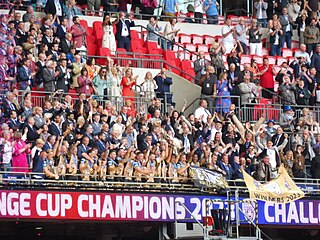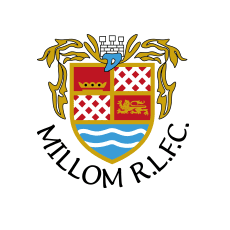
The Rugby Football League (RFL) is the governing body for rugby league in England. Founded in 1895 as the Northern Rugby Football Union following 22 clubs resigning from the Rugby Football Union, it changed its name in 1922 to the Rugby Football League.
The Rugby League Conference, also known as the Co-operative Rugby League Conference as a result of sponsorship from The Co-operative Group), was a series of regionally based divisions of amateur rugby league teams spread throughout England, Scotland, and Wales.
The National Conference League comprises the five levels of the British rugby league system and is at the top end of the amateur pyramid and sits below the professional League One. It comes under the jurisdiction of the Rugby Football League. The National Conference League has promotion and relegation between the Premier Division and Division Three although there is no promotion or relegation between the Conference League South, Regional Leagues or promotion to League One without an application to the RFL.

Rugby league is played across England but is most popular in Northern England, especially Yorkshire and Lancashire where the game originated. These areas are the heartland of rugby league. The sport is also popular in Cumbria where the amateur game is particularly powerful.

Nottingham Outlaws are a rugby league club from the city of Nottingham, England. They were founded in 1999 and their first team plays in the Premier Division of the Yorkshire Men's League. They have a junior section and in 2006 launched an academy team. They play their home matches at their own ground at Lenton Lane Nottingham NG7. They are also known as the 'hooded men'.

Millom R.L.F.C. is an amateur rugby league club based in the town of Millom in Cumbria. It is the oldest amateur rugby league club in the world, having been founded in 1873.

The Pennine Amateur Rugby League, or Pennine League is a rugby league competition for amateur open-age clubs that runs from September to April for clubs around the Pennines area. The competition is run by the British Amateur Rugby League Association (BARLA).
Cumbria Rugby League is a series of summer rugby league competitions for amateur teams in Cumbria.
The British rugby league system is based on a nine-tier structure administered by the Rugby Football League.
Kelvin Skerrett is an English former professional rugby league footballer who played in the 1980s and 1990s, and coached in the 2000s. He played at representative level for Great Britain and Wales, and at club level for Hunslet, Bradford Northern, Western Suburbs Magpies, Wigan and the Halifax Blue Sox, as prop or second-row, and coached at club level for Oulton Raiders ARLFC, and Methley Royals ARLFC.
The Rugby League Conference (RLC), also known as the Co-operative Rugby League Conference as a result of sponsorship from The Co-operative Group, was a series of regionally based divisions of amateur rugby league teams spread throughout England, Scotland and Wales.
David "Dai" Jenkins initially played Rugby Union. He changed codes when he was 21 and played Rugby League between 1935-1957, mainly for Leeds Rugby League Club as a scrum-half.
The 1913–14 Northern Rugby Football Union season was the 19th season of rugby league football.
The 1914–15 Northern Rugby Football Union season was the 20th season of rugby league football. It featured Huddersfield's "Team of all talents" which became the second team to win all four cups.
Rugby league is played at a school level in many schools in the rugby league heartlands of the traditional counties of Yorkshire, Lancashire and Cumberland; recently it has been introduced into some schools outside the traditional areas in particular in London, Essex and Hertfordshire. Thirty-three percent of schools across the UK offer rugby league as a school sport.

Rugby league is played across England, Ireland, Scotland and Wales, but its heartland in parts of Northern England is where the sport is most popular, and is where the majority of professional clubs are based. The sport was first established in the George Hotel, Huddersfield, where 22 clubs split from the Rugby Football Union to form the Northern Rugby Football Union.
The 1941–42 Northern Rugby Football Union season was the third season of the rugby league’s Wartime Emergency League necessitated by the Second World War. With fewer clubs than the previous season the Rugby Football League (RFL) decided to amalgamate the two county leagues into one joint league. The season started with 18 clubs but finished with 17 after Broughton Rangers withdrew in January 1942. The single division championship was won by Dewsbury, who had finished the season in first position and then defeated Bradford Northern in the play-off final.
Whilst the sport of rugby league is played across Great Britain, it is most popular in its heartlands, the traditional counties of Yorkshire and Lancashire with the majority of professional and semi-professional clubs coming from this area of the country. Many fixtures are considered to be local derbies, where both teams come from the same town or city, or two that are very close to each other.
Rugby League in Yorkshire refers to the sport of rugby league in relation to its participation and history within Yorkshire, England. The traditional county is the largest in the United Kingdom and as thus has many rugby clubs, professional and amateur.
The RFL Yorkshire Cup is a rugby league county cup competition for teams in Yorkshire. Starting in 1905 the competition ran, with the exception of 1915 to 1918, until the 1992–93 season, when it folded due to fixture congestion.





